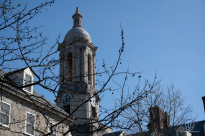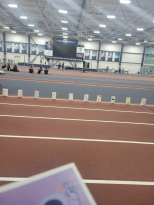State College Borough Hosts Conversation on Policing and Race
STATE COLLEGE, Pa.- The State College community gathered at the Friedman Auditorium Tuesday night for a conversation on the intersection of policing and race.
The audience sat silently as the moderators of the discussion, Jason Browne and Sue Marshall, introduced themselves and the seven panelists on stage: Anton Aluquin, Patricia Best, Lt. Chad Hamilton, Iris Richardson, Dr. Shoba Wadhia, Terry Watson and Officer Dean Woodring.
“Our intention tonight is to not have a debate, but to actively listen to each other’s perspectives,” Browne said.
From there, ground rules were laid as Marshall said that “we’re starting from a place where we assume everybody has good intention” and “because we are invested in the community and want to make it better for everyone else.”
How trust can be built between both communities and police was the first question that each panelist was asked to answer.
Woodring mentioned how the community was “fortunate enough” to have both Penn State and the State College Police Department working together so closely.
He went on to talk about the importance of utilizing outreach programs and events.
“I think it’s important to reach out to those community members that are more hesitant to participate in said events and gain a better understanding of each other,” Woodring said.
Aluquin is the structural reform chair for the 3/20 Coalition, an organization “committed” to working towards social and racial injustice.
He said that one of the questions he and his organization has wanted to answer for a long time is how they can make policing within Centre County more “equitable."
“As a part of the 3/20 Coalition I can say that I’m a police abolitionist,” Aluquin said. “I think to define that in my own perspective is [to] take the system of policing and remove the racialized structure that than which was founded.”
Immigration and addressing negative stereotypes were also discussed during the panel, along with the personal stories that some people on-stage shared.
Richardson talked about how at 8-years-old, as a kid growing up in Philadelphia, she never had positive experiences with the police where she lived in comparison with the officers in State College.
She also mentioned “the talk,” a conversation that black Americans have with their children on the racism they face due to unjust treatment from authority figures.
“I just wanted to hint how young these things are engrained in us and that we have to undo,” Richardson said.
Hamilton went on to put emphasis on training, human universals and respect.
“No matter who we’re talking to or who we’re talking about everybody wants to be heard and treated with respect.” Hamilton said. “That’s how we try to police and sometime that doesn’t always go ... but where we are that’s where want to approach it with everybody.”
Browne concluded the conversation with a final question, about people’s visions for the future and what are the final steps towards healing the relationship between communities and the police.
Richardson said “humanity” and “patience” are what it takes.
“I say [to] all the identities in this audience today, show up, show out and support each other and uplift each other,” Richardson said. “But also hold each other accountable.”
Leslie Laing, an audience member and State College resident, had a similar sentiment in that she believes that recognizing the issue between police and minority communities is key.
“Safety is really important, and trust is required for safety,” Laing said. “When [the police] witness national and local incidents, and they don't speak out against them, or say how their policies protect us from those things, happening, that leads to doubt and distrust.”
Community action and continuing to have “tough conversations” are things that Liang believes are key in solving the greater issue of policing and race.
Browne said that this form of “communication” is something that’s possible to accomplish and the event he moderated was “an important opportunity for us to communicate.”
“We can have an audience; we can have people laugh along the way; people can be very serious along the way; we can have a very real conversation together, and it works,” Browne said. “Let's do that again. And again, and again. . .”
Jon Mead is a fourth-year majoring in digital and print journalism. You can contact him at jkm6040@psu.edu.








